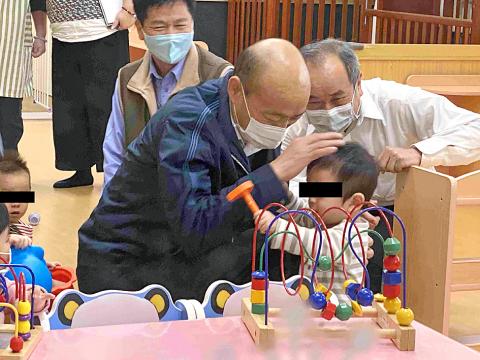More than 450,000 signatures have been collected for the second-phase petition of a campaign to recall Kaohsiung Mayor Han Kuo-yu (韓國瑜), with that number expected to surpass 500,000 by the middle of next month, Wecare Kaohsiung founder Aaron Yin (尹立) said yesterday, urging Han to “know when to quit.”
The recall petition organizers are “very close” to reaching their goal of 480,000 signatures, and the signatures include about 100,000 that were collected by Citizens Mowing Action, he said.
Organizers expect to have more than 500,000 signatures by the time they are to submit the second-phase petition papers to the Central Election Commission in the middle of next month, he said.

Photo: Huang Hsu-lei, Taipei Times
That they have been able to continue to collect signatures is an expression of the “collective will” of Kaohsiung’s residents, he said.
Despite a shortage of funds and resources, organizers would “fight to the end,” and they hope Taiwanese would support this “proud moment in the history of democracy,” he added.
The Civil Servants Election And Recall Act (公職人員選舉罷免法) permits political donations to election campaigns, but there are no such rules to aid recalls, Yin said.
He has consulted a lawyer about ways the campaign can attract more resources, he said.
Under the act, a review of a recall petition’s signatures must be completed within 40 days of their submission, and if deemed sufficient, a recall vote must be held 20 to 60 days later.
The threshold for the second stage of the recall bid is set at 10 percent of a city or county’s population, or about 228,000 in Kaohsiung’s case, while a formal recall would require at least 580,000 votes, or one-fourth of eligible voters in Kaohsiung in the final stage.
Asked about Yin’s comments, Kaohsiung Information Bureau Director-General Cheng Chao-hsin (鄭照新) said that city government colleagues are focused on running the city, including efforts to control the spread of COVID-19, and promoting bilingual education and agricultural products.
The January elections are over, while the COVID-19 outbreak is still changing, he said.
Instead of pursuing political goals, the city government is working for its residents every day, he added.
Meanwhile, former Taipei mayor Hau Lung-bin (郝龍斌), who is running in the Chinese Nationalist Party’s (KMT) chairperson election, said in a livestreamed interview that Han is “a very important asset and the pride of the KMT,” and that the party should rely on him.
Hau said he has “100 percent confidence” in Han’s ability to govern, and the next KMT chairperson should work closely with Han and help him avoid being recalled.
The KMT should cherish Han’s accomplishments in Kaohsiung and help him win the approval of the city’s residents, Hau said.
“Without Han Kuo-yu, the KMT could not have accomplished what it has,” he said.
In addition, those who voted for Han [in the Jan. 11 presidential election] are people who identify with the KMT, so the KMT should do a good job of internal reforms to repay them, Hau said.

Taiwanese can file complaints with the Tourism Administration to report travel agencies if their activities caused termination of a person’s citizenship, Mainland Affairs Council Minister Chiu Chui-cheng (邱垂正) said yesterday, after a podcaster highlighted a case in which a person’s citizenship was canceled for receiving a single-use Chinese passport to enter Russia. The council is aware of incidents in which people who signed up through Chinese travel agencies for tours of Russia were told they could obtain Russian visas and fast-track border clearance, Chiu told reporters on the sidelines of an event in Taipei. However, the travel agencies actually applied

Japanese footwear brand Onitsuka Tiger today issued a public apology and said it has suspended an employee amid allegations that the staff member discriminated against a Vietnamese customer at its Taipei 101 store. Posting on the social media platform Threads yesterday, a user said that an employee at the store said that “those shoes are very expensive” when her friend, who is a migrant worker from Vietnam, asked for assistance. The employee then ignored her until she asked again, to which she replied: "We don't have a size 37." The post had amassed nearly 26,000 likes and 916 comments as of this

New measures aimed at making Taiwan more attractive to foreign professionals came into effect this month, the National Development Council said yesterday. Among the changes, international students at Taiwanese universities would be able to work in Taiwan without a work permit in the two years after they graduate, explainer materials provided by the council said. In addition, foreign nationals who graduated from one of the world’s top 200 universities within the past five years can also apply for a two-year open work permit. Previously, those graduates would have needed to apply for a work permit using point-based criteria or have a Taiwanese company

The Shilin District Prosecutors’ Office yesterday indicted two Taiwanese and issued a wanted notice for Pete Liu (劉作虎), founder of Shenzhen-based smartphone manufacturer OnePlus Technology Co (萬普拉斯科技), for allegedly contravening the Act Governing Relations Between the People of the Taiwan Area and the Mainland Area (臺灣地區與大陸地區人民關係條例) by poaching 70 engineers in Taiwan. Liu allegedly traveled to Taiwan at the end of 2014 and met with a Taiwanese man surnamed Lin (林) to discuss establishing a mobile software research and development (R&D) team in Taiwan, prosecutors said. Without approval from the government, Lin, following Liu’s instructions, recruited more than 70 software